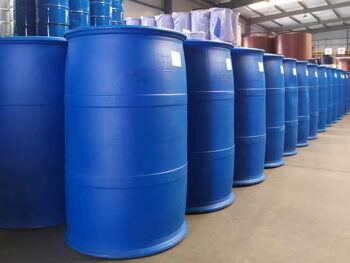Antifoaming agents, or defoamers, are essential chemical additives used in various water treatment processes and industrial applications to prevent or reduce foam formation. They work by disrupting foam stability, causing it to collapse and preventing reformation. Different types of antifoaming agents include silicone-based, oil-based, alkoxylated fatty acid esters, polymer-based, and inorganic antifoamers. These agents are used in wastewater treatment, cooling water systems, boiler water treatment, reverse osmosis, ultrafiltration, and various industrial processes. Selecting the appropriate antifoaming agent depends on factors such as the foaming problem, water chemistry, temperature, pH, and compatibility with other water treatment chemicals, with dosages typically ranging from a few ppm to several hundred ppm.
-
SILICONE ANTIFOAM COMPOUND
Organosilicon defoamer has high defoaming rate, and has a good inhibiting effect on foam. It can be used in solutions with different pH values, and can also be used in different temperature ranges. It is widely used in defoaming or foam suppression of textile dyeing and finishing chemicalbook processing working fluid or color paste. The dosage is generally 10-15mg/kg. This product can also be used as a defoamer in industries such as papermaking, chemical medicine, monosodium glutamate, and fermentation.
Reviews From Customers
John Smith
Sarah Johnson, Procurement Manager
Ardell.
- Water Chemicals
- Formic Acid Solution(CAS:64-18-6)
- Hot
- Phenyl acetonitrile(CAS:140-29-4)
- mercury(CAS:7439-97-6)
- Potassium Permanganate(CAS:7722-64-7)
- Bleaching powder(CAS:7778-54-3)
- Anhydrous sodium sulfite(CAS:7757-83-7)
- Sodium sulfide(CAS:1313-82-2)
- sodium ferrocyanide(CAS:14434-22-1)
- Methanol(CAS:67-56-1)
- Ammonium chloride(CAS:12125-02-9)
- Calcium peroxide(CAS:1305-79-9)
- Sodium hexametaphosphate(CAS:10124-56-8)
- Butylammonium black medicine(CAS:1533-42-2)
- sulfuric acid(CAS:7664-93-9)
- collector
- Sodium(CAS:7440-23-5)
- Foaming agent
- Ammonium nitrate(CAS:6484-52-2)
- Adjusting agent
- Industrial Compounds
- Sodium Butyl Xanthate(CAS:141-33-3)
- Mining Chemicals
- inhibitor
- Special Purpose
- Acetone(CAS:67-64-1)


